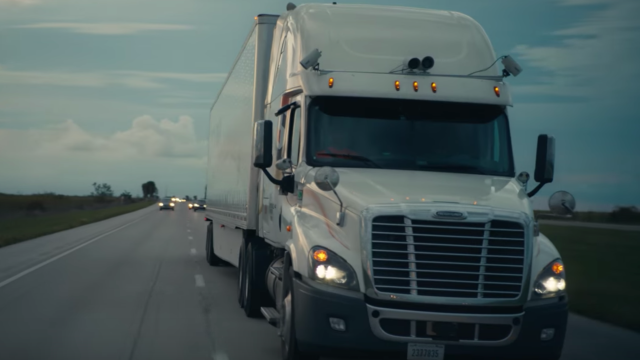Starsky Robotics is a self-driving truck company that was the first company to run an unmanned semi on a public highway. It’s now shutting down though, and its co-founder has some unusually sensible and honest things to say about the industry, unusual only because the industry is stuffed with charlatans.
Stefan Seltz-Axmacher co-founded Starsky around four years ago, eventually equipping a fleet of three tractor-trailers with self-driving equipment, making them capable of navigating private truck yards and, once, nine miles of a Florida highway.
Those might seem like modest accomplishments, but they were almost intentionally so, Seltz-Axmacher told Automotive News in an exit interview of sorts. That’s because the company placed a big emphasis on safety, which, shockingly, wasn’t popular with investors.
While competitors expended effort adding machine learning-based features such as enabling trucks to change lanes on their own, Seltz-Axmacher said he threw resources into safety engineering. The company was the first autonomous trucking company to submit a Voluntary Safety Self Assessment to the U.S. Department of Transportation.
But a problem emerged: that safety focus didn’t excite investors. Venture capitalists, Seltz-Axmacher said, had trouble grasping why the company expended massive resources preparing, validating and vetting his system, then preparing a backup system, before the initial unmanned test run. That work essentially didn’t matter when he went in search of more funding.
“There’s not a lot of Silicon Valley companies that have shipped safety-critical products,” he said. “They measured progress on interesting features.”
But it isn’t just safety tech that venture capital isn’t interested in, according to Seltz-Axmacher, it’s possibly the entire idea of investing in autonomous vehicles period. That’s because VC firms have been dumping money into self-driving startups for years now and starting to realise that maybe this whole self-driving thing isn’t around the corner.
“The VCs started to realise early last year that something was amiss in the autonomous industry,” he tells Automotive News. “They’re putting a lot of money in, and they’re not getting anything out.”
Along the way, he also became a disbeliever, mainly because of the problem with edge cases, or solving for obstacles and other things on the road a self-driving car will encounter that it doesn’t usually do. That could be a deer, for example, or challenging weather conditions, but each case is different, and it turns out that it gets exponentially harder and more expensive for machines to learn them the rarer they get.
Which Seltz-Axmacher ultimately concludes is a big problem for the industry, since to get a machine to be at least as good as a human will take billions and billions of more dollars of investment and likely years of testing. And now that the VC firms are getting wise to this fact, it makes it even less likely that the companies like Starsky will even be given the chance.
In Starsky’s case, that meant an investment round in November that fell apart, but he doesn’t think Starsky will be the last self-driving startup to encounter similar issues.
From a lengthy blog post Seltz-Axmacher published today:
There are too many problems with the AV industry to detail here: the professorial pace at which most teams work, the lack of tangible deployment milestones, the open secret that there isn’t a robotaxi business model, etc. The biggest, however, is that supervised machine learning doesn’t live up to the hype. It isn’t actual artificial intelligence akin to C-3PO, it’s a sophisticated pattern-matching tool.
[…]
The current companies [betting a business on safe AI decision makers] who are will continue to drain momentum over the next two years, followed by a few years with nearly no investment in the space, and (hopefully) another unmanned highway test for 5 years.
I’d love to be wrong. The ageing workforce which will almost certainly start to limit economic growth in the next 5–10 years; the 4000 people who die every year in truck accidents seem a needless sacrifice.
This is all a pretty dark vision for autonomous vehicles, but it’s also pretty convincing, in that unmanned self-driving still in 2020 doesn’t feel particularly close. And it’s refreshing to hear it from someone who gave it a proper go, and who no longer has a product to sell, just the wisdom of his own experiences.
